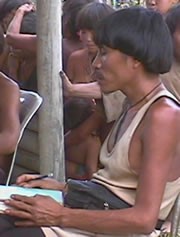Yanomami-Sanuma in Brazil

Photo Source:
Williams and Danalis
|
Send Joshua Project a map of this people group.
|
| People Name: | Yanomami-Sanuma |
| Country: | Brazil |
| 10/40 Window: | No |
| Population: | 700 |
| World Population: | 2,000 |
| Primary Language: | Sanuma |
| Primary Religion: | Christianity |
| Christian Adherents: | 60.00 % |
| Evangelicals: | 25.00 % |
| Scripture: | New Testament |
| Ministry Resources: | Yes |
| Jesus Film: | Yes |
| Audio Recordings: | Yes |
| People Cluster: | Amazon |
| Affinity Bloc: | Latin-Caribbean Americans |
| Progress Level: |
|
Introduction / History
The Sanuma people, also known as Xamatari, are an indigenous group residing primarily in the Amazonas and Bolívar states of southern Venezuela, with some communities also found in northern Brazil. They speak the Sanuma language, which belongs to the Yanomaman language family and is still actively used among them in Venezuela and Brazil. Historically, the Sanuma have lived in the tropical rainforests, maintaining a semi-nomadic lifestyle centered around hunting, fishing, and horticulture. Their cultural identity is closely tied to the rhythms of the forest, and they have preserved their traditions through oral storytelling and ritual practices.
What Are Their Lives Like?
The Sanuma live in small, scattered communities often located on high ground away from large rivers, which makes travel between villages physically demanding. Their daily lives revolve around subsistence activities such as cultivating manioc, bananas, and tobacco, and gathering forest products like honey, larvae, and fruits. Men typically hunt wild animals, including tapirs, monkeys, and birds, while women and children fish and forage. Despite their deep connection to the land, the Sanuma face increasing threats from illegal mining, deforestation, and environmental degradation, which have disrupted their traditional food sources and exposed them to disease and displacement.
What Are Their Beliefs?
The Sanuma practice animism, a belief system in which natural entities such as animals, plants, and rivers are thought to possess spiritual essence. Myths and rituals shape their worldview, and they show a strong reverence for the forest, which they see as both a physical and spiritual home.
Although some Sanuma have been exposed to Christianity, their traditional beliefs remain dominant. Spiritual knowledge is passed down through generations, often through ceremonies and storytelling led by elders.
What Are Their Needs?
Educational resources that respect and incorporate Sanuma language and culture are essential for preserving their identity and empowering younger generations. Improved healthcare access is critical, especially in light of the diseases introduced by mining activities and the lack of medical infrastructure in remote areas. Legal protection of their ancestral lands is urgently needed to prevent further encroachment by miners and developers, which threatens both their environment and way of life.
Prayer Points
Pray that the Sanuma people would encounter the gospel in ways that resonate with their cultural values and spiritual understanding.
Ask God to raise up indigenous believers who can share the message of Christ with clarity and compassion within their communities.
Pray that soon Sanumas will become disciples who disciple others.
Pray for Sanuma Christians to develop musical ways to present the gospel.